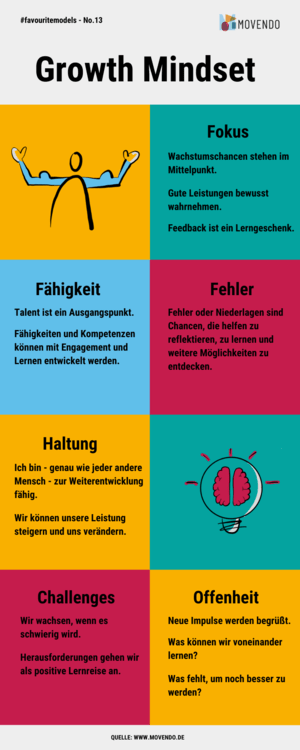Created by Susanne Stock
#favouritemodel No. 13 – Growth Mindset

aHow do people deal with defeat? What causes some to carry on seemingly undeterred afterwards, while others lose the courage to continue?
Carol Dweck has dealt with this question in her research. According to her theory, this is due to different mindsets. She distinguishes between the dynamic, growth-oriented mindset (growth mindset) and a fixed, rigid mindset (fixed mindset).
When people with a fixed mindset fail at a task, they attribute this to the fact that they obviously lack certain talents. They therefore tend to assume that their talents are innate and cannot be changed. Behavioral patterns can then be observed more frequently with which people try to hide defeats and repeat negative beliefs more often.
People with a growth mindset believe that their talents are only the starting point. They assume that their core skills can be developed through commitment and learning. This makes them more open to learning opportunities, new impulses and feedback. They see mistakes as an opportunity to learn something from them. They know their weaknesses, but are more open to working on them.
At first glance, this seems like a very fixed position. However, Dweck’s studies also show that our mindset can be developed and changed at any time through reflection and constructive interaction. A first step is to reflect on your mindset and practise focusing on positive experiences: What successes am I proud of? When have I learned or achieved something new through effort? Which people around me have perhaps had similar experiences to mine and have overcome their old thought patterns?
As a manager, your mindset also determines whether you see opportunities for growth and whether you tend to perceive a person’s strengths or weaknesses. You create an atmosphere of trust and encouragement by focusing on growth and resources.
The basic principles for promoting a growth-oriented mindset in your team are
- Believe that your team members can develop and improve their performance.
- See mistakes as positive learning opportunities.
- Take note of good performance and consciously give positive feedback.

How does my #favoritemodel help you?
Reflect on your personal mindset and the mindset in your team with the following questions:
- What personal development am I proud of?
- What skills have I developed?
- What challenge could I tackle in the near future to get out of my habitual patterns of behavior?
- What helps me to celebrate successes? How can I perceive even small successes and first steps in a better, more appreciative way?
- How can I deal with defeat more constructively? Who can support me? What can I learn from defeat?
- What skills do my team members have? Which of these skills do they demonstrate at work?
- What feedback would help my team members to make even better use of their strengths?
- How can we learn more constructively from mistakes as a team and improve our error culture?
Author

Susanne Stock
Project partner




